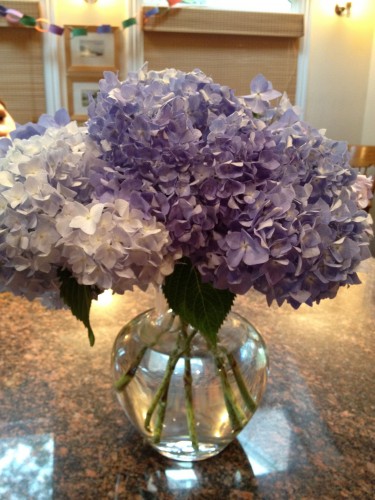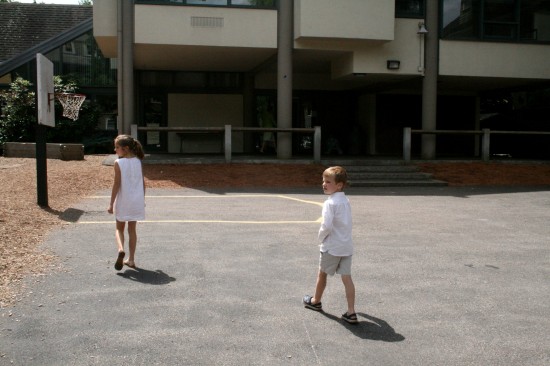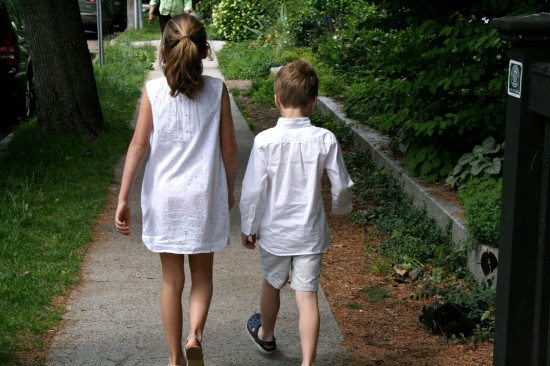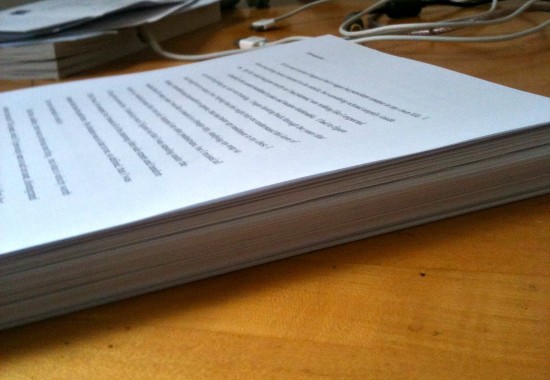
A snapshot of my version of “it all”: hydrangeas (one of our wedding flowers) grown by my husband, in our small front garden, on the kitchen island. In the back you can see a construction paper garland that Grace recently made for father’s day.
Like everyone else in the blogosphere and real-world-o-sphere, I have been participating in many conversations about Anne-Marie Slaughter’s cover story in the Atlantic, Why Women Still Can’t Have it All. While I certainly don’t have a clearly-articulated response to Slaughter’s comprehensive and thoughtful examination of working motherhood today, I do have a profound emotional response. By the third page of the article my eyes were full of tears, the words having touched some reserve of emotion in me as inarticulate as it is endlessly deep.
Most days I feel pretty good about my choices regarding work and family. Sure, I wonder sometimes what would have happened had I not “leaned back,” as per Sheryl Sandberg, before I was even pregnant. And yes, I do wonder what it would be like not to work, mostly whether I’d be a more relaxed and less distracted parent to my children. But on the whole I feel pretty good about the decisions I’ve made and about the trade-offs I make every day (I hate the word and notion of balance when it comes to this topic). My emotional reaction – quiet, but intense – when I read articles like Slaughter’s, however, suggests that something deeply buried in me still grieves, hurts, and wonders. About and over what, I am not entirely sure.
Mostly what Slaughter’s article has me thinking about, though, is what “it all” really means. My friend Kathryn, who is one of those can’t-live-without-her-friends that are for me a big component of feeling like I have anything like “it all,” emailed me to say she was at home because her nanny was out, sitting on her bed with her laptop working while her children lay on either side of her watching TV. Is this “it all,” she mused?
For me, the answer to that is yes.
I am certain this is a deeply personal equation, and one that changes every day. For me there are some elements of “it all” that are non-negotiable. Downtime with my children most days. A happy relationship with my husband. Work that I find challenging with colleagues I respect and learn from. Not missing any – or almost any – school events, plays, concerts, assemblies. My handful of dear friends, those native speakers whose companionship I cherish. Time, several days a week, to think and write about this divine and devastating life. Time to read. Eight hours of sleep most nights. Time, several days a week, to run by myself. The calculus of how each day’s hours are allocated is ever-shifting; I think having “it all” is something we ascertain over the arc of weeks and months, not in a single day.
The point of Slaughter’s piece with which I agree with most vociferously is that flexibility is absolutely essential to making this particularly rich, and demanding, phase of life work. There’s no question that that is true for me. I’m certain that my ability to be present for events both big and small in the lives of my children while working full-time has a lot to do with my job’s flexibility. Of course I’ve made compromises though, and I have written before about how my life over the past years has simultaneously narrowed and widened. What I’m not totally clear on is where the line is between a mature acknowledgement of the need for compromises and a defeatist acceptance of “not having it all.”
There is lots I don’t have. Lots. Tons of children. A book published. A fancy house. A perfect figure. Extravagant vacations. Sound sleep every night. A marathon under my belt. A high profile CEO job. A real yoga practice. Unbitten fingernails. A yard for my children to run in. A king size bed. A red-headed child. A basic orientation towards calm.
But I think I would say that in the ways I care about, I do have it all.
What is your definition of “it all”?



